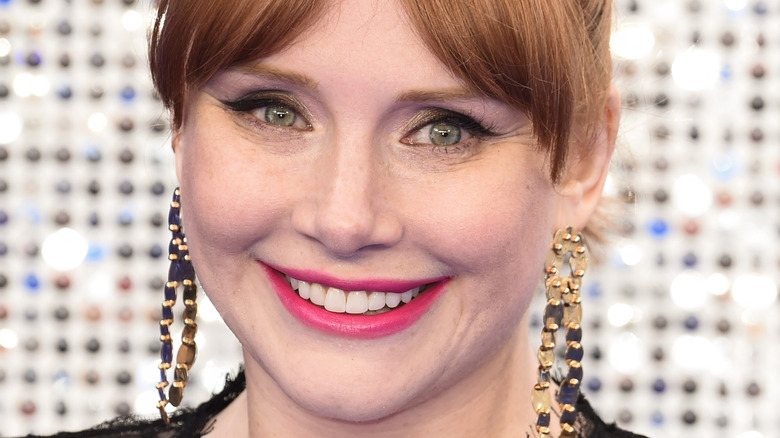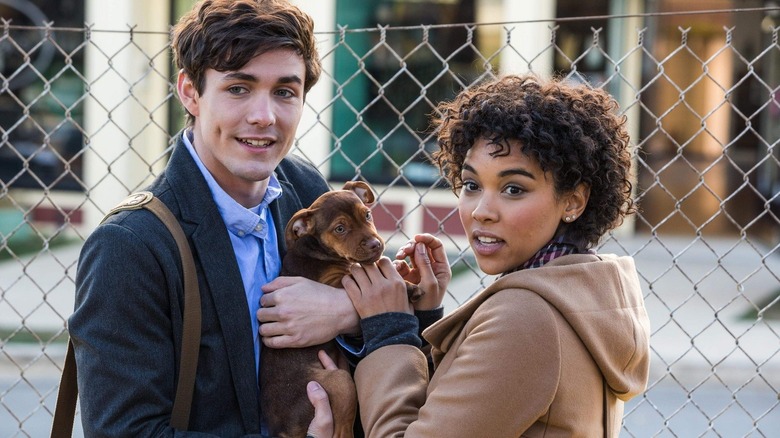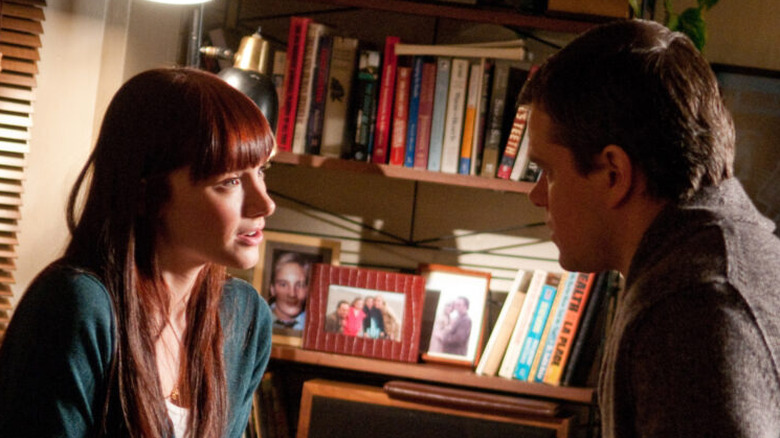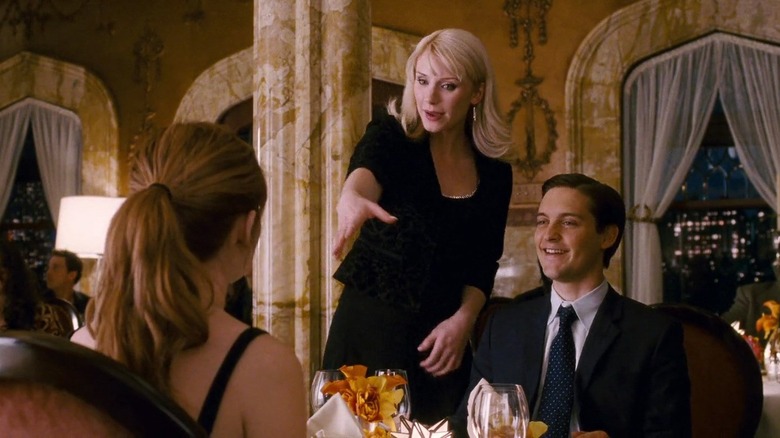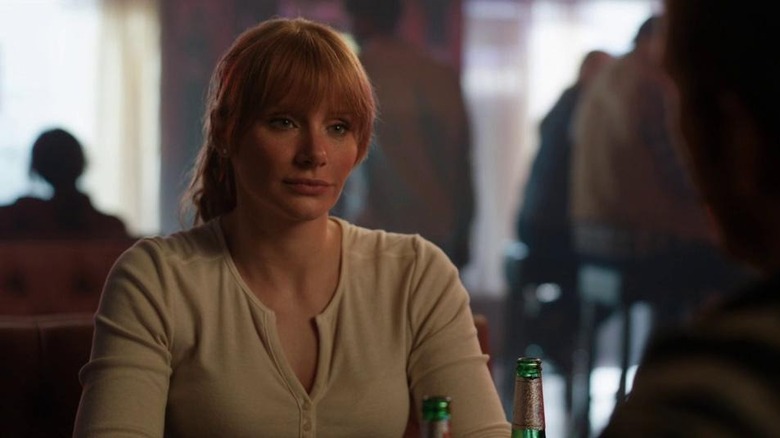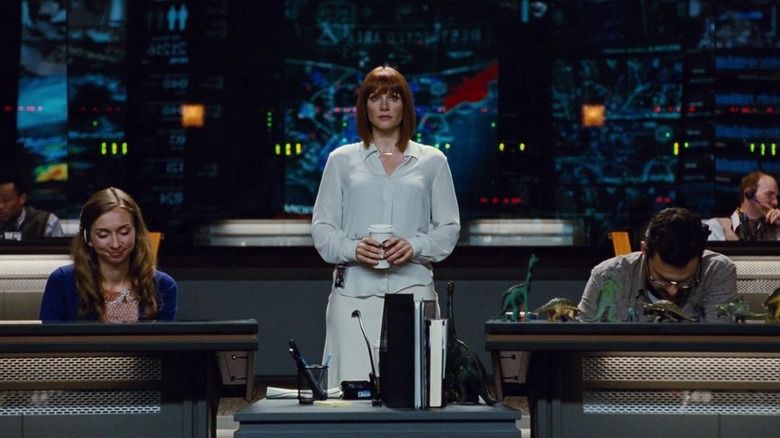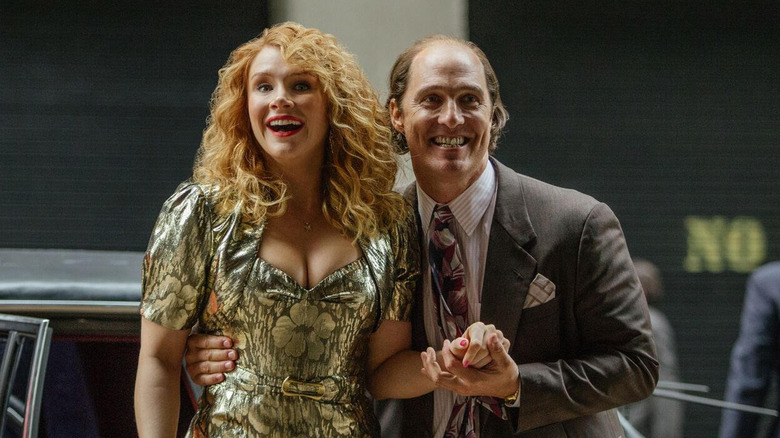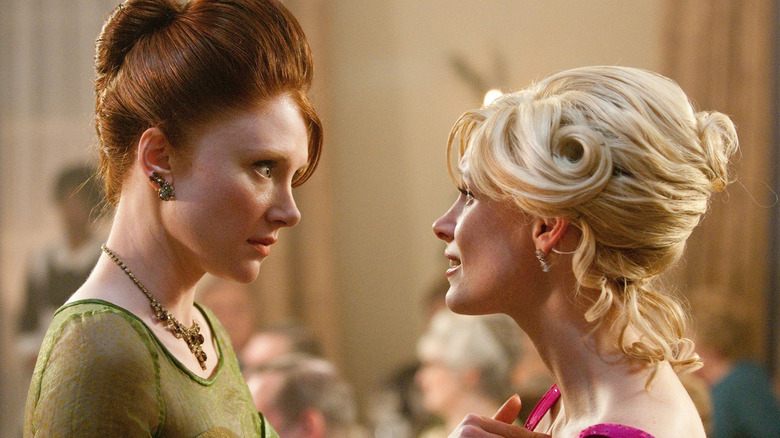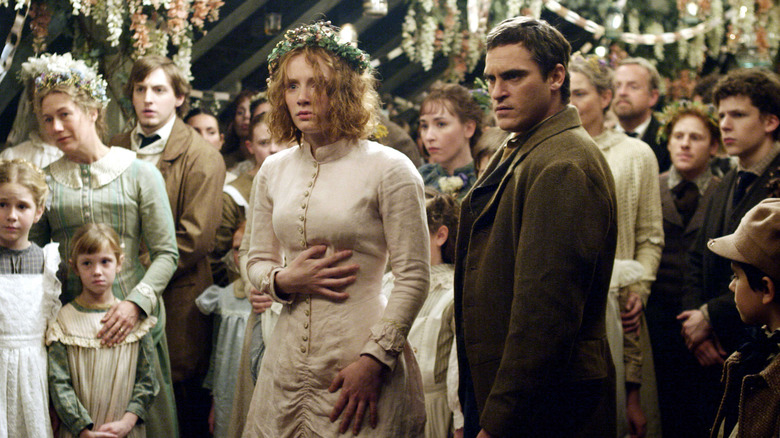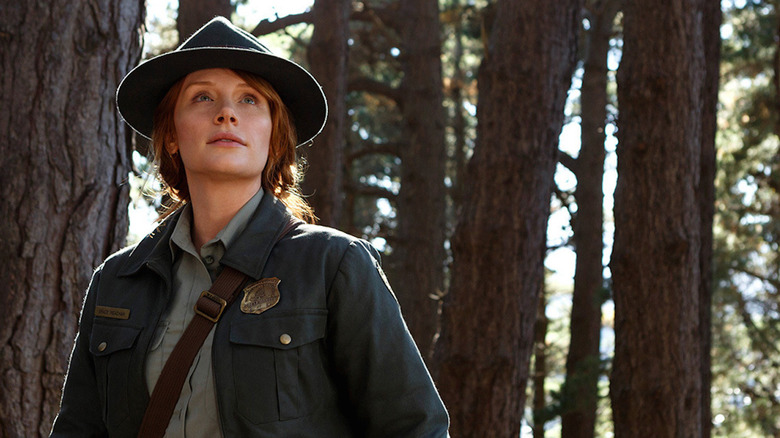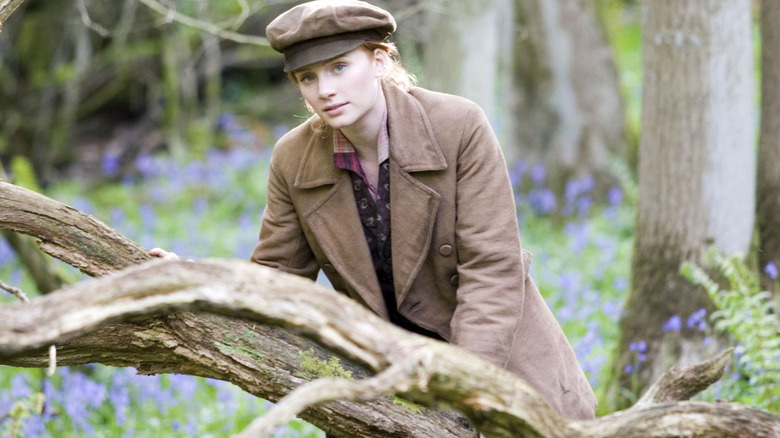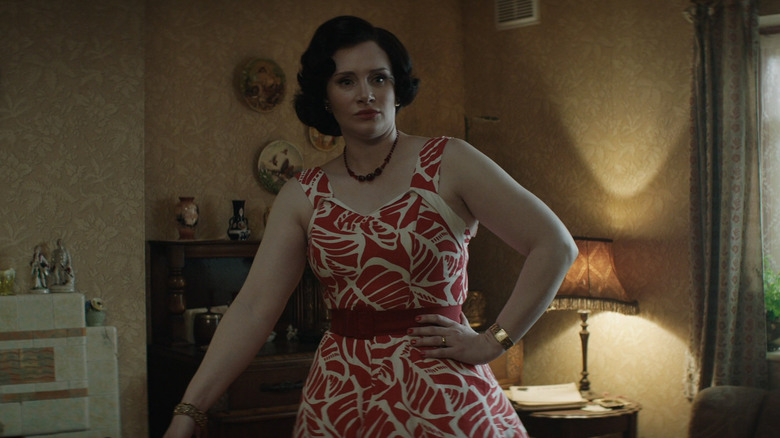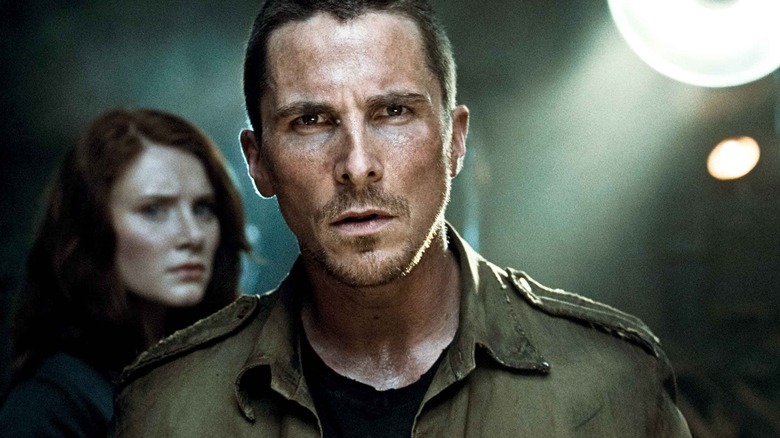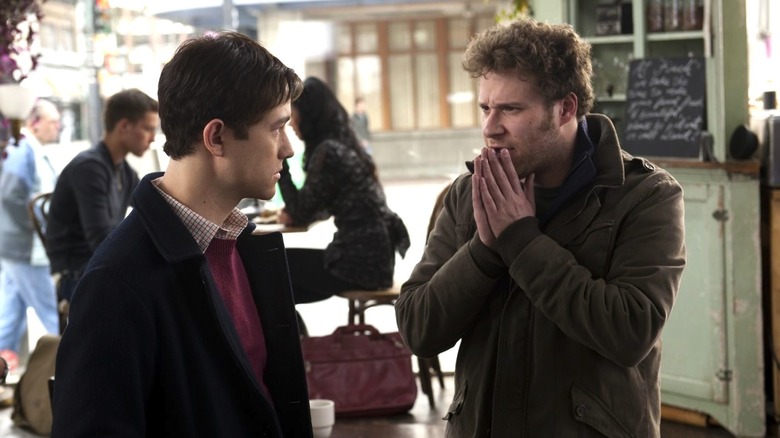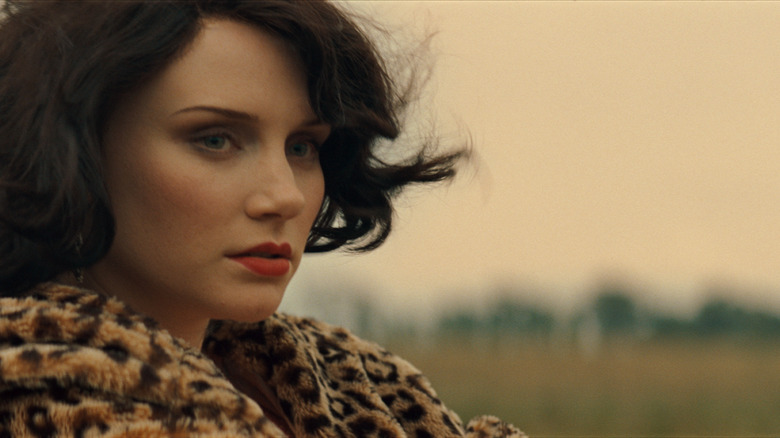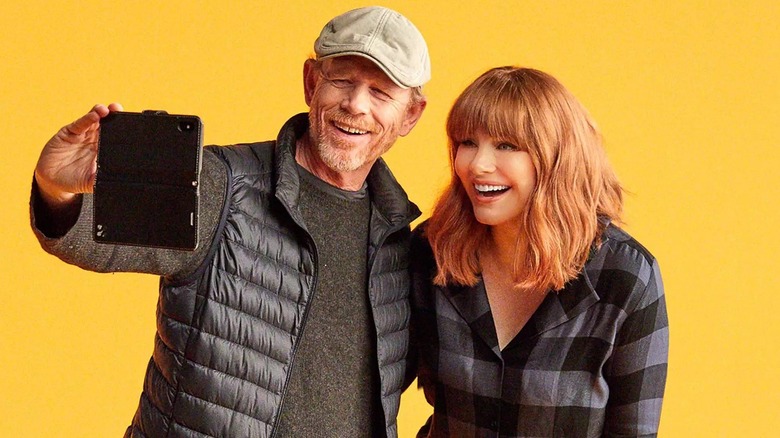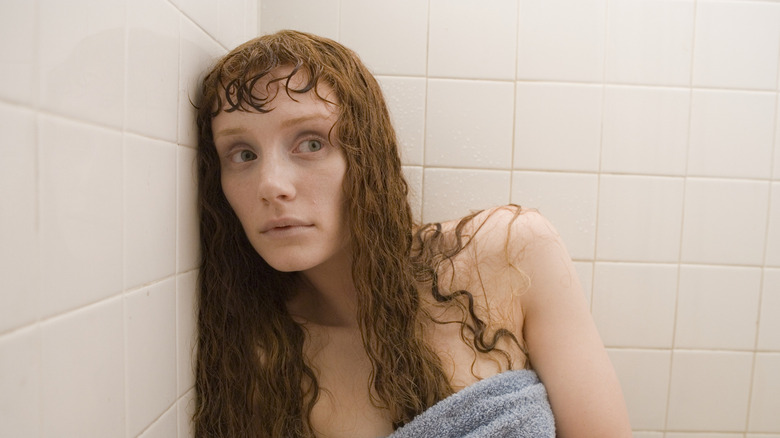Bryce Dallas Howard's 8 Best And 8 Worst Movies
For most moviegoers, Bryce Dallas Howard is most instantly recognizable through her work as one of the lead characters of the massively successful "Jurassic World" franchise, Dr. Claire Owen. However, thanks to being a regularly working actor for nearly two decades, Howard has managed to assemble a variety of acting roles that stretch way beyond the parameters of "Jurassic World." Howard has also managed to headline films that range from William Shakespeare adaptations to fluffy period pieces to Disney remakes to dark thrillers and everything in between.
Just as varied as the genres she's explored is the critical reception her assorted films have scored. Some of these productions became critical darlings while others, even if they contain well-liked Howard performances, have been largely dismissed. The eight best and worst features Bryce Dallas Howard has either appeared in or directed got their respective critical reputation for a vast array of reasons, with the general reputation of some even evolving over time. What becomes especially apparent after examining the critical highs and lows of Howard's career, though, is how this "Jurassic World" leading lady is always pushing herself to new and exciting places as an artist.
Best -- A Dog's Way Home
Bryce Dallas Howard is never seen onscreen in "A Dog's Way Home," but she's still an essential part of the movie thanks to her providing the voiceover work that brings the thoughts of canine Bella to life. While Howard's vocals are used to deliver jokes about Bella's naïve thoughts on everything from bacon to life itself, the situation that Bella finds herself in is anything but a laughing matter. Separated from her owner, Lucas, Bella proceeds to embark on a 400-mile journey to get back to Lucas. That would be a daunting task for anyone, let alone one plucky pooch.
The stakes of this narrative informed a feature that wasn't quite the best in show for critics, but the generally positive marks for "A Dog's Way Home" suggested it would satisfy fans of live-action dog movies. While expressing surprise at how "intense" the movie was, Lindsey Bahr of the Associated Press was largely pleased with what "A Dog's Way Home" delivered. Even while conceding that the feature was unabashedly sugary-sweet and familiar, she also observed that the entire affair did end up being effectively sentimental. The title alone lets viewers know what they're getting into here and the film managed to deliver nicely on those expectations.
Worst -- Hereafter
The expansive narrative of Clint Eastwood's "Hereafter" makes room for a wide variety of performers. Matt Damon, who anchored Eastwood's earlier directorial effort, "Invictus," inhabits the main role, while more unpredictable members of the cast of this dark drama include comedian Jay Mohr, Richard Kind, and even an appearance from Derek Jacobi as himself. Also here is Bryce Dallas Howard, playing the role of Melanie, a potential love interest for Damon's protagonist. Combining such a wide variety of names with a darker tale tinged with supernatural overtones, all told under the direction of an Oscar-winning filmmaker like Eastwood, should theoretically be able to offer something of note. Unfortunately, while critics didn't exclusively hate on "Hereafter," the notices for this title were primarily mixed.
William Thomas of Empire highlighted the performance of Howard, along with Damon, as one of the best parts of "Hereafter," but overall felt the film fell flat thanks to uninvolving storytelling choices and subpar acting from a pair of child actors portraying twins. Dana Stevens of Slate, meanwhile, admired the slow pacing of "Hereafter" but wished the movie offered more to chew on while it tried the patience of moviegoers. Though not an all-time bomb, "Hereafter" fell short of utilizing all its potential, including making full use of Howard's gifts as a performer.
Best -- Spider-Man 3
In the years since its release, "Spider-Man 3" has become more than a bit of a punching bag. Key moments like Peter Parker strutting down the street have become sources of internet mockery while fans of characters like Venom have expressed displeasure with how little screen time those individuals received. Even "Spider-Man 3" director Sam Raimi has spoken disparagingly about the blockbuster. Given all these factors, it can be hard to remember that, when it was initially released, "Spider-Man 3" got generally decent marks from critics. Though a step down from the reception of its predecessors, the broad response from critics was more akin to the reviews of "Doctor Strange in the Multiverse of Madness" than the ones that greeted, say, "Steel."
Stephanie Zacharek of Salon openly admitted that "Spider-Man 3" was too overstuffed for its own good in her review of the blockbuster, but also commended the way humanity constantly manifested in the feature as well as how certain images evoked the power of classic silent films. A similar sentiment was echoed in Tom Charity's review of "Spider-Man 3" for CNN, where he noted the film struggled under its own weight, but still delivered enough spectacle to satisfy fans of the earlier "Spider-Man" movies. "Spider-Man 3," which featured Bryce Dallas Howard as Gwen Stacy, was far from exempt when it came to criticism, but many critics still found more to praise in the feature than tear down.
Worst -- Jurassic World: Fallen Kingdom
After "Jurassic World" rebooted the "Jurassic Park" saga for the 21st century, "Jurassic World: Fallen Kingdom" strolled into movie theaters keen to keep the momentum going. The new elements of "Fallen Kingdom" weren't just limited to the film's director, franchise newcomer J.A. Bayona. The film would also steer the saga into gothic horror territory for the first time while also taking the concept of cloning within the "Jurassic Park" universe to a whole new level through the introduction of cloned humans. There was a lot in "Fallen Kingdom" that attempted to give the series a new jolt of life. Unfortunately, critics were mixed on the end result of all those attempts to bring something unexpected to this franchise.
Lots of details about the movie came under fire in the mixed reviews for "Fallen Kingdom," but one recurring sentiment centered on the tonal problems of the movie. David Sims of The Atlantic, for one, found that "Fallen Kingdom" couldn't properly realize the central dinosaurs as both frightening and majestic, which made it hard to get swept up in their power. Roxana Hadadi of Chesapeake Family Magazine, meanwhile, complained that "Fallen Kingdom," despite gesturing at going somewhere new, ended up being distractingly derivative of its predecessors. With these kinds of complaints, Bryce Dallas Howard's second foray into dinosaur mayhem secured a reputation as disappointingly average.
Best -- Jurassic World
It's just not possible for any follow-up to "Jurassic Park" to recapture the magic or quality of that 1993 blockbuster. The original "Jurassic Park" is such a seminal classic, one revered by critics and audiences alike, that you can't hope to recapture such singular lightning in a bottle. Of course, Hollywood being Hollywood, there have been multiple attempts to craft a worthy successor that have been met with varying degrees of critical reception. The 2015 installment "Jurassic World," headlined by Bryce Dallas Howard and Chris Pratt, fared best among critics: while not met with universal praise, the reception to "Jurassic World" by and large commended this title for being a fun ride.
Part of what Wesley Morris of Grantland appreciated with "Jurassic World" was how, even with massive expectations on his shoulders, writer-director Colin Trevorrow embraced the production with a lighthearted touch. For Morris, this was a movie that knew it was supposed to be silly, which went a long toward mitigating its shortcomings. An extremely positive assessment from Alex Abad-Santos of Vox, meanwhile, noted that Howard's performance was given ample room to thrive within a screenplay that often showed heavy interest in female perspectives. It wasn't hailed as the second coming of "Jurassic Park," but "Jurassic World" was still perceived as fine popcorn entertainment.
Worst -- Gold
While Matthew McConaughey's striking physical transformation to play the lead role in "Gold" is the most eye-catching aspect of the movie's cast, the supporting players include Bryce Dallas Howard as the female lead, Edgar Ramirez, Corey Stoll, and Bruce Greenwood. With so many talented actors, one would expect that moviegoers would have stumbled onto cinematic treasure when watching "Gold." Unfortunately, the critical response to the Stephen Gaghan-directed feature was nowhere near as stellar as its actors.
The mixed reception to "Gold" largely hinged on how difficult it was to get immersed into the central plot and characters. Writing for The Guardian, Wendy Ide commended McConaughey for throwing himself into playing a disheveled con man but was disappointed that "Gold" didn't offer much else to the viewer beyond an over-abundance of montages. For her, the project was too surface-level and gave its main performers far too little to work with. Jason Bailey of Flavorwire took special umbrage with how "Gold" saddled Howard with a stereotypical wife character with no interior life of her own. With these kinds of shortcomings, it's no wonder "Gold" was dismissed by so many critics.
Best -- The Help
"The Help," which featured Bryce Dallas Howard as its primary antagonist, got generally good reviews upon its initial theatrical release in 2011. However, even with these first reviews, there was a general understanding that the film had some grave shortcomings. Roger Ebert, for instance, praised the feature as an example of especially well-made feel-good cinema, but freely admitted that this wasn't as deep or insightful as it could be. He compared the whole thing to a "fable" rather than an accurate or substantive examination of racial discrimination in the 1970s. Peter Travers of Rolling Stone went even further in his praise and dubbed "The Help" as something truly special, particularly when it came to the performances of cast members like Octavia Spencer or Viola Davis.
In the years since its debut, the initial criticisms of "The Help" have garnered more prominence, with many of them focusing on how the film centers white perspectives in a story that's ostensibly about Black women. Even Howard herself has acknowledged the flaws in "The Help" and even noted that she would not appear in the movie if she were offered it now. Even with a complicated legacy, the initial reviews for "The Help" were more than positive enough to make it a standout title in Howard's filmography.
Worst -- The Village
The earliest M. Night Shyamalan movies, like "The Sixth Sense" and "Signs," were largely acclaimed works, ones that garnered much of their positive feedback from striking filmmaking and storylines that didn't forget their grounded humanity even in their most outlandish moments. However, after "Signs," Shyamalan fell into a critical funk for many years. In this period, one of Shyamalan's most divisive works was "The Village." A 2004 film about a group of people living in an isolated rural village who adhere to strict rules that shut out the wider world, "The Village" was one of two Shyamalan movies, along with "Lady in the Water," anchored by Bryce Dallas Howard.
Despite Howard's striking breakout performance, "The Village" largely struck out with critics. Anthony Lane of The New Yorker, for one, was displeased with how relentlessly serious "The Village" was and wished Shyamalan made more time for bursts of humor or other moments of levity in such a preposterous horror film. David Edelstein of Slate did take time in his otherwise negative review to praise Howard, dubbing her "an excellent actress with ... movie-star magnetism." Aside from her, though, Edelstein found little to praise in "The Village" and was especially frustrated by how the film avoided tackling deeper questions posed by its central concepts. Such takeaways were a far cry from the widespread positivity that greeted earlier Shyamalan films.
Best -- Pete's Dragon
Remaking a classic Disney movie can be a fool's errand. These movies are such an integral part of people's childhood that retreading that hallowed ground can inspire only skepticism in people. Plus, deviating from those films can inspire immense ire from a passionate base of "The Lion King" or "Beauty and the Beast" fans. Wherever you go with such projects, it seems like you're destined to come up short. The 2016 remake of "Pete's Dragon," directed by David Lowery and starring Bryce Dallas Howard, managed to score the best possible critical outcome for such a project. Largely jettisoning everything about the original 1977 film, this new "Pete's Dragon" was an acclaimed project perceived as a worthy standalone movie rather than a hollow echo of the past.
Emily St. James of Vox pinpointed that the reason "Pete's Dragon" worked so well was that, among other virtues, it wasn't afraid to be quiet and let small human moments simmer. She also pointed out that the film felt quite distinctively the work of Lowery, particularly in its emphasis on a community of humans coming together. Such laid-back and soft vibes made the production stand out among modern family movies, let alone in the specific category of 21st century Disney remakes, and cemented "Pete's Dragon" as an extremely special feature.
Worst -- As You Like It
Yet another Kenneth Branagh directorial effort based on a William Shakespeare play, the 2007 film "As You Like It" isn't one of Branagh's most acclaimed forays into the Bard's timeless works. Despite having actors like Bryce Dallas Howard and David Oyelowo inhabiting key roles in the production, "As You Like It" was given primarily negative reviews by critics. Trevor Johnston of Time Out aptly summed up many of the critiques of "As You Like It" by bemoaning the dreadful pacing in the middle of the film's runtime, while also criticizing the lack of vibrant life or uniqueness in what was far from the first big-screen adaptation of this particular Shakespeare play.
Stella Papamichael of BBC had high praise for Bryce Dallas Howard's performance in the lead role of "As You Like It," but otherwise found this to be a disposable and tedious vision of the Bard's work. All of Branagh's prior experience with directing film adaptations of Shakespeare's plays couldn't salvage his lifeless, critically-derided take on "As You Like It."
Best -- Rocketman
The likes of "Walk Hard: The Dewey Cox Story" have so perfectly distilled down the unavoidable tropes of the standard music biopic that it's easy to imagine that nobody could ever come up with a way to make this genre fresh again. But director Dexter Fletcher managed to inject heaps of life back into this domain with "Rocketman," a biopic chronicling the life of Elton John (Taron Edgerton). Along for the ride was Bryce Dallas Howard, entrusted with the important role of playing John's disapproving mother. "Rocketman" certainly got a boost from the presence of an actor as talented as Howard, but she was also quite lucky to be part of an acclaimed movie that critics praised for subverting expectations in the best possible ways.
Rebecca Harrison of Sight and Sound perfectly captured just what made "Rocketman" so special by singling out how the movie was unabashedly extravagant, campy, and queer, a perfect choice to tell the life of a man as outsized as John. As if all that weren't enough, she was also impressed by the film's assortment of superbly-realized musical numbers and its "honesty" about the struggles of John's life. Throw all that together and it's no wonder Harrison, like so many critics, had no trouble recommending the thrilling cinematic experience that was "Rocketman."
Worst -- Terminator: Salvation
Years before embarking on a trip to "Jurassic World," Bryce Dallas Howard was a part of another 21st century sequel to a seminal science fiction film from the 20th-century. Rather than hashing it out with dinosaurs, "Terminator: Salvation," saw Howard tangling with robots from the future. Taking over the role of Kate Connor from Claire Danes (who first portrayed the character in "Terminator 3: Rise of the Machines"), Howard's time with the "Terminator" saga was far less successful critically than her "Jurassic World" stint. "Terminator: Salvation" got some of the weakest reviews for a "Terminator" movie, with critics widely disparaging the picture as being a far cry from the better entries in this saga.
John Hartl of the Seattle Times was crushed that "Terminator: Salvation" was such a lifeless enterprise compared to its predecessors, with this critic being especially disappointed that all the dystopian action had no engaging human characters you could root for. He also observed that Bryce Dallas Howard was one of many actors in the cast to get nothing to do thanks to a tepid script. Thankfully for Howard, she would eventually find far more stable footing in the world of blockbusters long after "Terminator: Salvation" vanished from the minds of most moviegoers and critics.
Best -- 50/50
One of Seth Rogen's earliest forays into more dramatic fare came with the 2011 feature "50/50." Starring Joseph Gordon-Levitt as a man who gets diagnosed with cancer, it wasn't exactly the kind of story you'd expect to get anchored by the comic actor-writer behind "Knocked Up" and "Superbad." However, this was a passion project for Rogen and the more dramatic aims of the feature could be seen by the cast for "50/50." Rather than featuring people that were common sights in other Rogen comedies, the likes of Bryce Dallas Howard and Anna Kendrick populated the supporting cast.
Going in a different direction served Rogen and the whole cast well, as "50/50" ended up scoring widespread critical acclaim. The likes of Ann Hornaday of The Washington Post were impressed with how well "50/50" avoided the pitfalls that plagued other melodramas whose stories involved life-threatening diseases, with "50/50" trading hollow schmaltz for "compassion and unsentimental wit." Lisa Schwarzbaum of Entertainment Weekly, meanwhile, observed that Rogen's experience merging biting comedy with poignancy in his R-rated comedies served him well in finding just the right tone for "50/50." These and other reviews made it clear that the odds of moviegoers enjoying "50/50" were high indeed.
Worst -- The Loss of a Teardrop Diamond
In 2009, director Jodie Markell unleashed "The Loss of a Teardrop Diamond" onto the world. The project used an unproduced screenplay penned by iconic playwright Tennessee Williams and starred Bryce Dallas Howard and Chris Evans in the lead roles. It may seem impossible that a new work by Williams would fly under the radar, but the negative reviews for "Teardrop Diamond" kept moviegoers away. Williams' prose inspired many great movies, but unfortunately, "The Loss of a Teardrop Diamond" was decidedly not part of that esteemed canon.
Lisa Schwarzbaum of Entertainment Weekly noted that the script was "unproduced — until now — for a reason." While adding that Howard "looks peachy" in the lead role, Schwarzbaum found the script too lifeless and the characters way too derivative of figures in other Williams plays. Lou Lumenick of The New York Post blamed the problems with "Teardrop Diamond" on its filming style, which he saw as being more evocative of a "TV movie" than a theatrical feature. He also echoed Schwarzbaum's criticisms of the script's familiarity by noting that it indulged in too many storytelling hallmarks of previous Williams scripts. The mixture of Howard, Evans, and Williams was nowhere near enough to counterbalance the grave problems dragging "The Loss of a Teardrop Diamond" down.
Best -- Dads
After helming a pair of short films and an episode of "The Mandalorian," Bryce Dallas Howard became a feature film director with the 2020 documentary "Dads." An exploration of the various forms of fatherhood, "Dads" blends interviews with celebrity dads with more intimate examinations of everyday fatherhood, including Howard reflecting on the relationship she has with her dad, Ron Howard. While not especially insightful or substantive, "Dads" proved to be a critically successful feature-length directorial debut for Howard.
While openly admitting that "Dads" wasn't a game-changing documentary, Noel Murray of The Los Angeles Times did praise "Dads" for being a breezy and agreeable watch, as well for offering perspective on the kind of pressures that rest on the shoulders of 21st century fathers. As for Beandrea July of The Hollywood Reporter, she was especially enamored with the segments where Howard listens to stories from non-celebrity fathers from around the globe. For July, the open vulnerability and acknowledgment of parenthood challenges in these scenes lent depth to a movie that could have easily devolved into mushy anecdotes from financially secure actors. Acknowledging the hardships of fatherhood lent a twinge of nuance to "Dads" and helped cement it as a well-received and promising foray into long-form filmmaking for Howard.
Worst -- Lady in the Water
Bryce Dallas Howard and M. Night Shyamalan's pair of collaborations didn't get off to a good critical start with "The Village." However, it looked like "The Sixth Sense" compared to the kinds of reviews the duo's second film together, "Lady in the Water," would receive. An attempt by this auteur to make something more akin to a fairy tale than a straightforward thriller, "Lady in the Water" was savaged upon its initial release, with the film practically drowning in criticism.
Roger Ebert, for one, was confounded by "Lady in the Water" and particularly its insistence on overwhelming the viewer with complicated lore that it never uses either logically or interestingly. Ebert also found significant flaws in the visuals as well as uninteresting characters who are entirely defined as broad stereotypes. Nathan Rabin of The A.V. Club found it hard to get immersed in the fantastical world that "Lady in the Water" was built on, thanks to the barrage of "self-reflexive" tendencies in Shyamalan's screenplay. He also was disappointed in the "strangely lifeless" lead performance from Howard as the film's titular character. With these kinds of scathing assessments, it's no wonder Howard and Shyamalan have not reunited in the years since "Lady in the Water."
